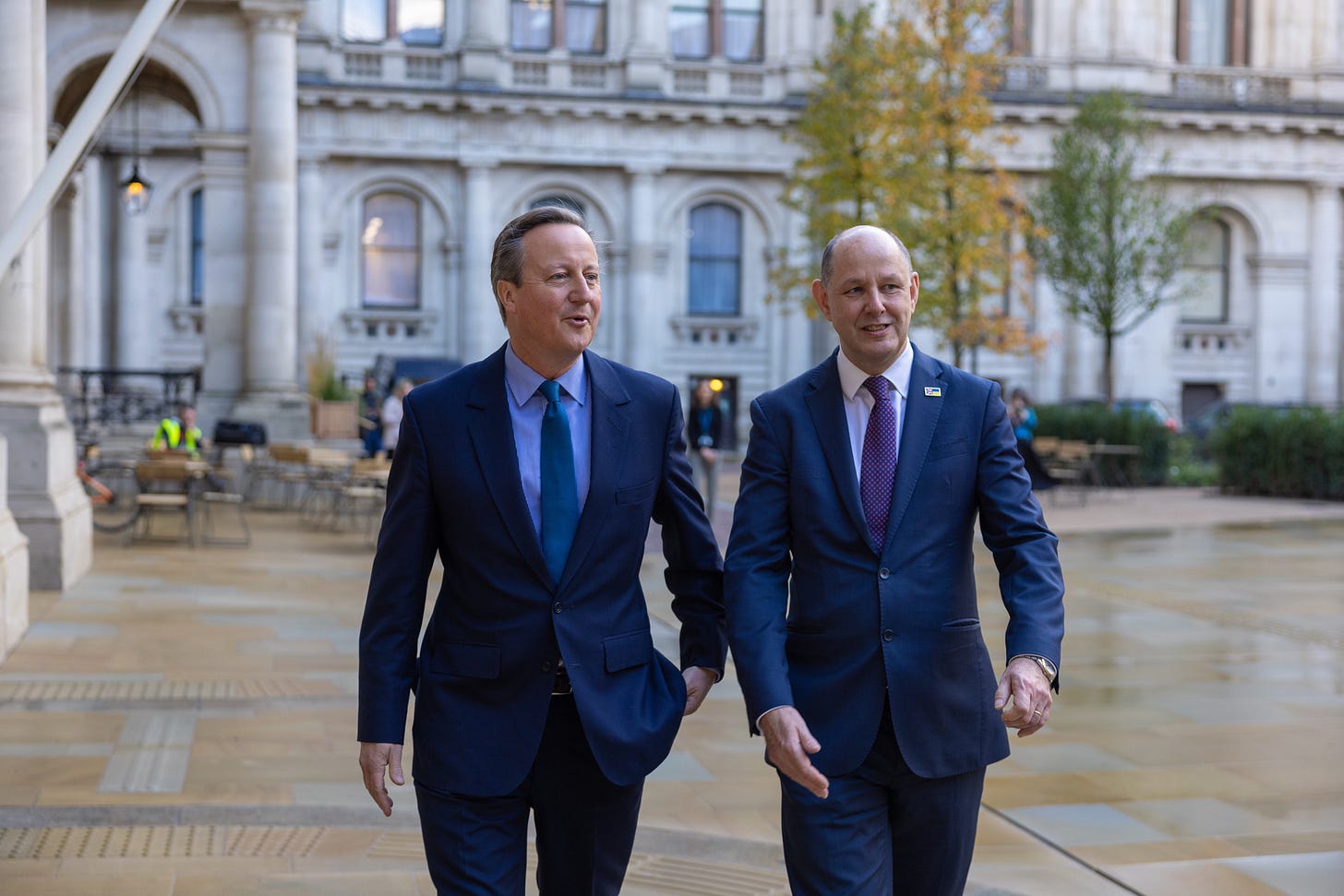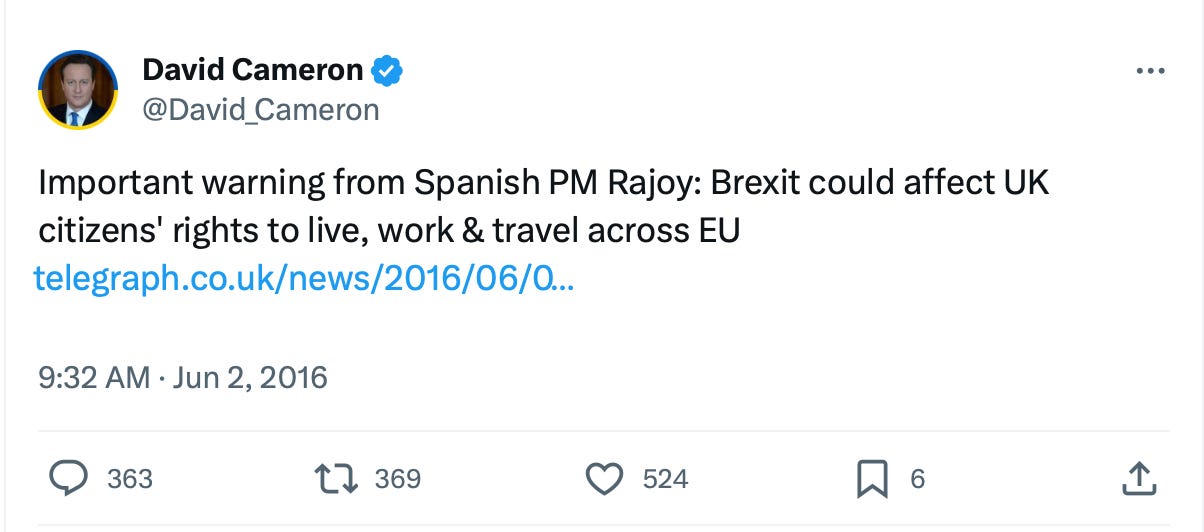The history man: Cameron's back, and his tweets are still there
Plus the magicians on Reddit who make AI do amazing things

In one of the most remarkable political appointments in four years of utterly bizarre political appointments, the British Prime Minister Rishi Sunak on Monday appointed former PM David Cameron as his foreign secretary—one of the “four great offices of state” (the other two being Chancellor and Home Secretary). The serious preparations, in the form of exploratory talks with Cameron, had apparently been going on for about a week; that means the plans for the ousting of Suella Braverman from the Home Office predated her dire op-ed for The Times, in which she attacked the police for going too soft on protesters in a protest rally that hadn’t even happened yet. (If you needed an example of Braverman’s predilection for talking without thinking, that’s a typical one.)
Last week I discussed how Braverman’s burbling inevitably threw Tory WhatsApp groups into a ferment. (This drew a sort of relieved sigh in the comment section from Tom Watson, the former Labour Cabinet Office minister in 2008-9 who was also deputy party leader in 2015-2019, during which time he probably got pretty sick of WhatsApp ferment.) In that, I introduced the my little political communication matrix: a 2x2 of public and politicians, showing how you’d hope the two groups communicate. Politicians certainly talk via WhatsApp. But what about the other way?
Cameron’s appointment gives us the perfect opportunity to look at what happens when politicians try to tell the public things.
Among the British public, Cameron is best known for getting an outright win in an election in 2015, very much to his surprise. He thought it would be another coalition, as had just happened for five years with the Liberal Democrats. The election campaign was one of the first times that Twitter became a useful tool, and so Cameron’s account was used to tweet the occasional political attack line, such as this one in May 2015:
Having won the election (and phew, saved us from a “coalition of chaos”—we had to wait for Theresa May’s post-2017 government trying to keep Northern Ireland’s madly pro-Brexit DUP in line for that), Cameron then found himself obliged to run a referendum on membership of the European Union. He was for it, because as he was keen to point out (on Twitter) a couple of weeks before the vote, leaving would be bad:
Not only would Brexit make it harder to live, work and travel in the EU, but it would also affect the UK economy:
To be honest, there’s an absolute ton of tweets from Cameron’s account about how misguided/bad/awful Brexit would be, discoverable with a straightforward search around June 2016.
Which should make it slightly embarrassing, surely, when he’s appointed foreign secretary, ie the guy who will have to negotiate treaties and so on, the guy who wanted to Remain in the Cabinet of someone who backed Brexit. And it comes at the scrag end of a set of post-Cameron administrations which have ever more thoroughly purged anyone who didn’t think that Brexit was the most wonderful idea ever. Even the “meaning” of Brexit has shifted since Cameron was last behind an official lectern: when he was saying “oh well, screwed that up then” back in June 2016, Brexit meant—no, not that, Theresa—ending membership of the European Union. Seven years later, it has transmogrified into meaning you want to resile from the European Convention on Human Rights (ECHR), be able to ignore international law on refugees and safety at sea, and basically do what the sod you like. This is not, it’s safe to say, how the rest of the world viewed “the meaning of Brexit”.
Now Cameron has to shrug and pretend that he thinks Brexit is fine. But his tweets are out there, like bad farts, and people are taking a rare delight in quoting them back at him. The “chaos with Ed Miliband” tweet had already been retweeted and quoted for years. But it lifts the spirits of those who aren’t enjoying the political situation.
Yet it’s unsatisfying. When Rishi Sunak’s account tweets something preppy, there’s a ton of reaction, but the account itself never responds. When the Conservative Party account tweets the Cabinet reshuffle as though it’s football transfer day, it doesn’t respond to people pointing out how weird it is to treat affairs of state like trivia. The studied indifference of these accounts is unsurprising—when you have thousands of interactions across multiple platforms, you’re unlikely to get it right even if you try to respond—yet it’s also unsatisfying to the onlooker or participant.
Cameron and other big-name politicians are in the privileged position of not having to care what people say about him on Twitter (or TikTok, or Facebook). For most other people, their tweets can be a sort of buried munition which might come to explode under them without warning. Twitter is littered with people being “held to account” (translation: pilloried) for an opinion they may once have held, or passing comment they might have made, which is now judged to be outrageous. (And you know what outrage means.)
Sometimes it’s deserved. A classic example was Toby Young’s defenestration from a ridiculously skewed appointment in January 2018 to be a universities regulator because of past sexist and, simply, offensive tweets (wheelchair ramps were signs of “ghastly inclusivity”, for example). What you say on social media reflects something of what you are: it might only be the part of you that types things into the empty box on a social media platform, but it’s still part of you. When Toby Young tells you who he is, believe him.
The disassociation that people feel when they’re online was explained in 2004 by John Suler, professor of psychology at Rider University in New Jersey. His paper was about the effect of online anonymity, but you can also see how someone who’s sufficiently aloof might treat it just the same. I describe it in Chapter 3 of Social Warming:
He identified six factors at work: people felt disconnected from what they were writing; the other participants were literally or figuratively invisible; any discussion was asynchronous, with no way to force responses; you had to decide for yourself how to interpret others’ comments (as serious, ironic, foolish and so on); what you wrote wouldn’t impact your physical life; and, finally, real-life status and authority didn’t transfer onto a screen, so everyone was effectively equal, squashed into the same number of pixels on the screen. (Suler also dismissed the suggestion that how users behaved online revealed their ‘true’ identity. For someone who was shy in person yet outgoing online, neither was the ‘true’ representation, he said; they were just facets of the same persona.)
Young certainly didn’t reflect that his tweets were going to have an impact on his offline life. Once he’d been so roundly disabused of that idea, he responded as you’d expect: he deleted thousands of tweets, and has continued to do so with a system which (used to?1) routinely deletes his social media posts.
Cameron, though, sails on untroubled. His tweets are an untroubled sea of political bumptiousness: visits to Ukraine, flagwaving, photographs of him looking serious. The dialogue that seemed to be promised between the electorate and the politicians through the arrival of social media hasn’t happened for so many. We can talk to them, but they don’t seem to listen. We didn’t choose this chaos, but we can’t get anyone to take notice.
The best comment on the entire farrago came in the form of a query at Prime Minister’s Questions on Wednesday, where Rishi Sunak normally waffles away when asked any question at all. Kevin Brennan, a Labour MP, stood up and asked:
“The Prime Minister has just said that David Cameron had unprecedented experience, so what would he say was his finest foreign policy achievement?”
Hansard records MPs’ reaction: [Laughter.]
Sunak gurgled for a bit, and then replied: “There are many, many to pick from, but what I would say is that under his leadership this country hosted what was widely considered to be one of the most successful G8 summits of recent times.”
He once held a good supper party? Good grief.
Glimpses of the AI tsunami
(Of the what? Read here. And then the update.)
• YouTube is asking uploaders to mark content using generative AI: “Specifically, the Google-owned vid-sharing giant will require content creators to disclose if their videos contain believable synthetic footage of made-up events, including AI-made depictions, or deepfakes that put words in people's mouths.” Good luck, as they say, with that. (Though there are penalties for not complying.)
• Chatbot hallucination rates can vary from 3% to 27%, though the tricky question is when those percentages will come into play. How can you know when a chatbot is going to just make something up? Would you trust a car that drives along the motorway perfectly 97% of the time but might just veer madly 3% of the time?
• How violent extremists are exploiting generative AI. To be expected, and as Ryan Broderick observes, this isn’t particularly different from the previous panics about Photoshop and other “creative” tools.
• Andreessen Horowitz invests in Civitai, which profits from nonconsensual AI porn. Classy, a16z, very classy. “Nonconsensual AI porn” is sort of where we started in December 2017, with Gal Gadot the unwitting, er, harbinger. (A month later you could watch Nicolas Cage being James Bond, which sort of makes up for it.)
• Google’s AI Magic Editor won’t touch ID cards, faces or bodies. Let’s see how well this holds up. The processing is on-device, so Google must have some method of recognition to exclude them.
• Inside the magical world of AI Prompters on Reddit. If you only read one link, it’s this one: the images on display, and the technology they imply, are just mindblowing.
• You can buy Social Warming in paperback, hardback or ebook via One World Publications, or order it through your friendly local bookstore. Or listen to me read it on Audible.
You could also sign up for The Overspill, a daily list of links with short extracts and brief commentary on things I find interesting in tech, science, medicine, politics and any other topic that takes my fancy.
• Back next week! Or leave a comment here, or in the Substack chat, or Substack Notes, or write it in a letter and put it in a bottle so that The Police write a song about it after it falls through a wormhole and goes back in time.
Who knows if those tools still work. Never used them.




